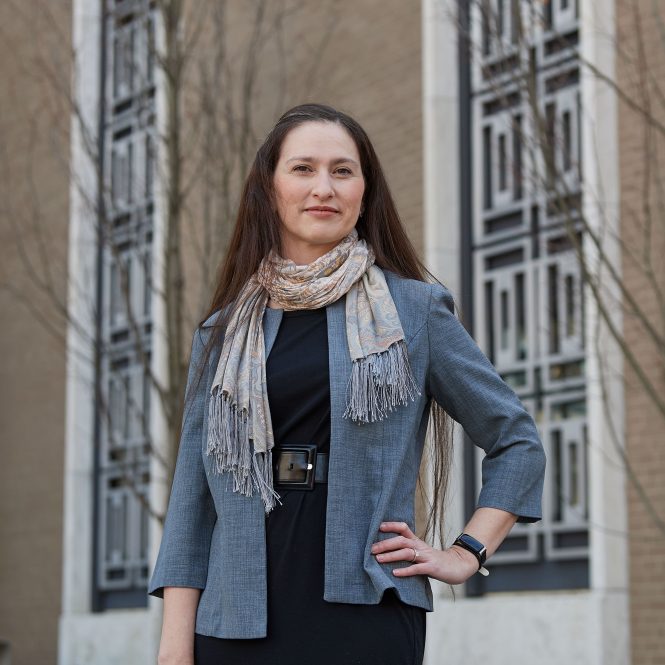Don’t look for Ellen Messali ’10 JD on Monday nights.
You won’t find her in her car, where she’s typically making good use of her hands-free function to knock off phone calls during her 45-minute commute.
You won’t find her running, even though she’s invested in a home treadmill since the coronavirus pandemic has kept her away from the gym where she was once training for a 10K.
You won’t find her binging on podcasts, though she’s become an avid listener since this proud former “technology rejecter” finally caved and got her first smartphone in 2019.
You also won’t find her at her desk at New Haven Legal Assistance, though on many other nights she’s probably there, working well into the evening preparing briefs or evidentiary records or making other arrangements for her clients, many of whom are in detention facilities outside of Connecticut and all of whom are refugees and immigrants fleeing circumstances beyond their control.
Instead, on Monday nights, Ellen Messali is tap dancing.
She started tap dancing at two years old, stopped for more than a decade, and picked it back up at age 31. Even Covid-19 hasn’t slowed her, thanks to an innovative dance instructor, video conferencing on Zoom, and a portable dance floor in her home.
Tap dancing is her escape, she says, playing a huge role in her sanity, something vital for an attorney who spends her days and nights thinking about her cases and her clients and, often, the violent and traumatic circumstances that have led them to seek legal aid.
“It’s a lifesaver,” she says. “I think it’s the one thing that sort of helps repair a lot of mental health damage throughout the week.”
A UConn Law graduate, and a product of professor Jon Bauer’s tutelage at the Asylum and Human Rights Clinic, Messali has worked at New Haven Legal Assistance for just over four years, and she helped to establish the Immigration Unit there.
She primarily does removal defense, with a priority for detainees being held in federal custody, and as one of the few law groups in Connecticut doing this kind of work, the Unit is busy, especially under the immigration policies in place during the past four years.
“When you’re not detained, it’s much easier to find counsel,” she explains. “You have much more time to pursue and prepare your applications for relief, because the detained docket moves so quickly. You have your first hearing, and then, a month later, you have your final hearing and in that time you’re supposed to find counsel. That counsel’s supposed to prepare an application for you, talk to numerous witnesses to try to get statements on your behalf, gather evidence from you when you’re in lockup — I mean, it’s a system created to be impossible.”
It is work that she views as “insanely important,” but that’s only part of why she’s dedicated herself to it. She’s a second generation American, but she’s quick to say that she doesn’t have an immigration story of her own.
“I wanted to do something that would feed my soul,” she says, and because of her mother, a humanitarian. “I grew up watching her just be a good person.”



